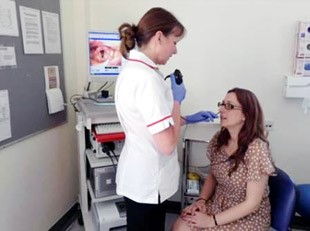Speech & Language Therapy case study
What does a Speech & Language Therapist do?
Speech and language therapists are specialists in assessing and treating a wide variety of disorders of speech, language, communication and swallowing, and work as part of a multi-disciplinary team in acute and community settings. They improve outcomes for patients of all ages from early intervention for children with communication difficulties, or on the wards assisting stroke patients with recovering their swallowing ability. They use specialist equipment such as videofluoroscopy to view a patient’s swallow and vocal tract to assist in diagnosis and treatment.
Hear from Judith, a specialist Speech and Language Therapist with Norfolk Community Health & Care
Brief description of my role: My job is to assess, treat and manage swallowing (dysphagia) and communication difficulties acquired as a result of neurological damage in patients with highly complex needs. At CCSRS we aim to see the most complex 10% of rehabilitation patients whose needs are more complex that the community rehabilitation services are able to manage. Complexity may be because of severity of disease, complex social, emotional, financial or vocational issues.
Where/how long I trained: I trained at City University in London from 1986-1990 (4 year BSc(hons) degree)
Career progression so far: I had always wanted to work in neurology from a young age following the devastating impact of having 2 school friends who sustained brain injuries. My mother was a physiotherapist working with older adults and I used to love going to work with her when I was young and spending time in the physio gym chatting to the patients (this was in the 1970s, I’m not sure that would be allowed these days!!!!)
When I qualified there were very few adult-based neurology roles and working with dysphagia was a developing specialism with an emerging evidence base so roles were few and far between. Initially I took a split role working in a children’s developmental centre and with adults with learning disabilities but within a year, I was able to secure a role in adult acquired disorders. From there I gained a specialist role in dysphagia working in both acute and community settings as well as maintaining a caseload of communication impaired patients. On moving to Norfolk, I continued with a mixed community and hospital based caseload until returning after maternity leave to a community only post. In 2015 I joined the team at CCSRS.

Happy healthy people providing excellent compassionate care
What I enjoy about my job: I love the opportunity to work with and learn from a multidisciplinary team of therapists, nurses, doctors and psychologists who all bring a different perspective to patient management. I am fortunate to have SLT colleagues with a breadth of experience and expertise so we can support each other with more difficult decision making and therapy provision.
I have been fortunate that I have always been encouraged to embrace new initiatives and throughout my career I have been supported to continue the learning journey and use the new learning to improve patient care.
As a SLT it has always been very important to me that patients with communication difficulties are empowered to make their own decisions when they have capacity to do so and I see accurate assessment and provision of adapted ways to communicate as a vital part of my role. Even after therapy, many patients will continue to have some ongoing communication and swallowing difficulties but our interventions feel successful when patients are able to move forward with their lives feeling they have achieved an acceptable quality of life and their family, friends and care team understand how to support them.

